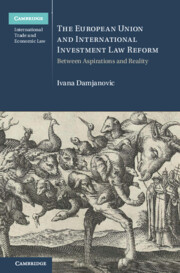Book contents
- The European Union and International Investment Law Reform
- Cambridge International Trade and Economic Law
- The European Union and International Investment Law Reform
- Copyright page
- Contents
- Figures
- Tables
- Foreword
- Acknowledgements
- Table of Cases
- Table of Legislation
- Abbreviations
- General Introduction
- Part I International Investment Regulation
- Part II The Internal Investment System of the EU
- Part III The External Investment System of the EU
- General Conclusion
- Bibliography
- Index
General Introduction
Published online by Cambridge University Press: 13 July 2023
- The European Union and International Investment Law Reform
- Cambridge International Trade and Economic Law
- The European Union and International Investment Law Reform
- Copyright page
- Contents
- Figures
- Tables
- Foreword
- Acknowledgements
- Table of Cases
- Table of Legislation
- Abbreviations
- General Introduction
- Part I International Investment Regulation
- Part II The Internal Investment System of the EU
- Part III The External Investment System of the EU
- General Conclusion
- Bibliography
- Index
Summary
Public and political controversies over Investor–State Dispute Settlement (ISDS) have prompted reform processes at international and regional levels. As an emerging actor in this field, the European Union (EU) has been particularly active in shaping new developments, within and outside the EU, and proposing the establishment of a Multilateral Investment Court (MIC). This research examines the underlying reasons and ways in which the EU has been shaping the field of international investment law (IIL) in order to address its own and global ISDS problems. The analysis of EU law and policy solutions envisioned to reform investment law in this book is undertaken in light of the IIL controversies, the EU constitutional and legal framework and the rule of law and legitimacy, as the normative goals of the ISDS reforms. In doing so, this book evaluates the contribution of the EU to the development of international law in the field of investment.
Keywords
- Type
- Chapter
- Information
- The European Union and International Investment Law ReformBetween Aspirations and Reality, pp. 1 - 14Publisher: Cambridge University PressPrint publication year: 2023

